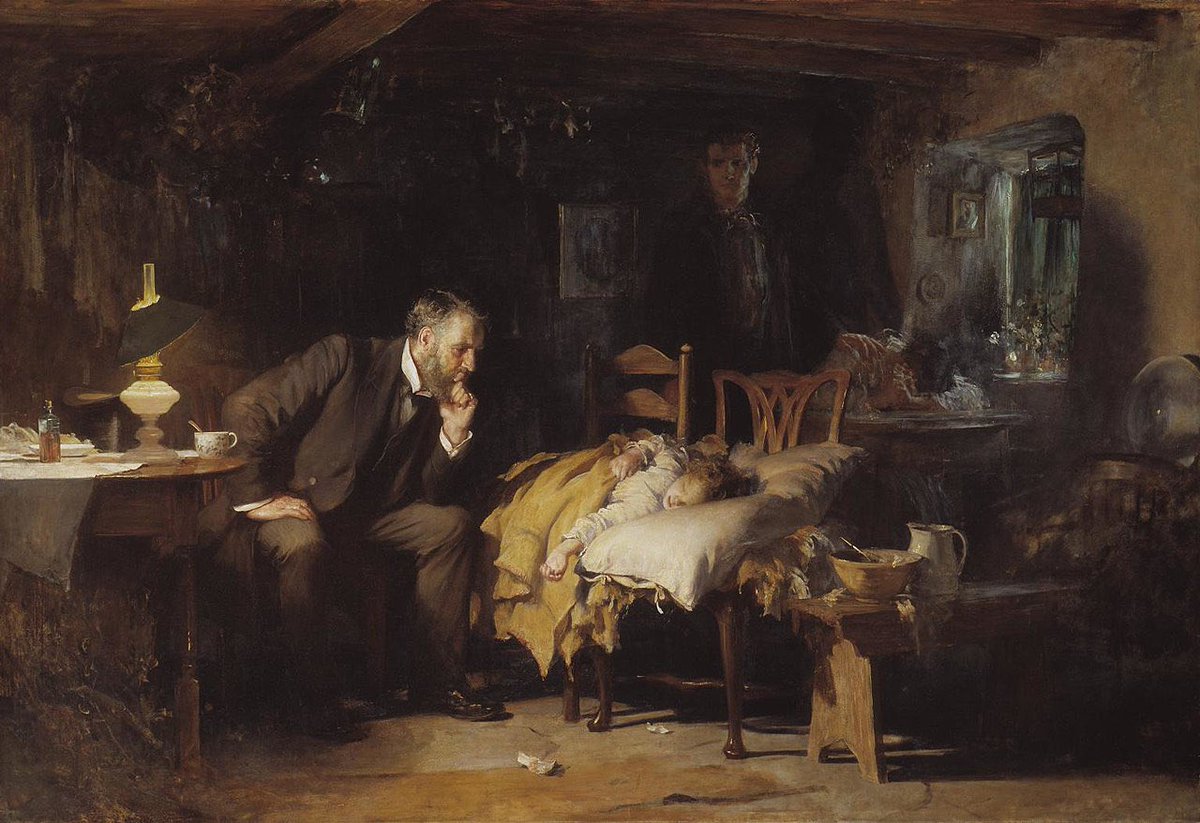The room is still.
Darkness envelopes most of it, except for the first rays of light from the rising sun, filtering through the curtains.
A lone lamp has its shade tilted to provide a little more light.
A battle has been waged throughout the night. 1/
It is 1877, in rural England. He has been asked to see the daughter of a laborer.
The doctor is well-known, and well-liked, and very busy.
But he makes time when he is needed. 2/
The truth is he has entered many small cottages like this one. There is something particularly wrenching about tragedy, when it visits the poor.
He says a silent prayer, and then nods a greeting as the door is opened. 3/
There is a wild hope blazing in the father’s eyes as he grasps the doctor’s hand tightly.
“Bless you sir!” He says repeatedly.
The doctor smiles warmly as he enters. 4/
The air smells musty, earthy.
He hangs his overcoat on a hook by the door, along with his hat. And then he turns to the room.
It is a small, modest place. Two chairs have been pressed together to make a bed. 5/
Eyes closed, sunken, she seems more ghostly than real. Her blonde hair feathers out on the pillow above her head, a halo.
Her mother sits beside her, gently running her fingers through her daughter’s hair. 6/
There is medicine within this ritual, the unveiling of scientific implements: stethoscope, thermometer, medicines in bottles, tinctures in vials.
Reassurance. 7/
“And what were her symptoms?” As he asks questions, the doctor moves to the child’s side, taking a seat.
Her mother answers. “Fever for a week. A rash.” 8/
The mother senses it, and her reddened eyes fill again with tears.
“Doctor, please, in the name of all that is holy, will-“. She can’t finish. 9/
He exhales deeply, and repeats himself, more slowly. “She is -very- ill.”
The tears flow freely now, and the mother rises to her feet, walking to the back of the room. 10/
He presses gently on her belly and notes her grimace, listens to the rattling in her lungs, then the slowness of her heartbeat.
Danger... 11/
In twenty years, a vaccine for typhoid will be developed, saving half a million British lives.
By 1909, the US military is vaccinating for typhoid.
It will be cureable. 12/
The third week of this illness is the most critical. His experience tells him the child’s life is on the edge of a knife.
He can do nothing but bear witness.
Her parents linger. 13/
“Doctor, would you like something to eat?” The mother asks.
He smiles. “A cup of tea would be lovely.” 14/
The world is asleep.
In the small cottage, a struggle as old as time itself is taking place.
The doctor’s gaze never leaves his tiny patient. His teacup is in his hands, and he runs a fingertip along the rim pensively. 15/
Darkness envelopes most of it, except for the first rays of light from the rising sun filtering through the curtains.
A lone lamp has its shade tilted to provide a little more light.
A battle has been waged throughout the night.
The girl is motionless. 16/
The father lingers in the shadows, one hand resting on her shoulder, unsure if he should speak the unimaginable into existence.
“Sir, is my daughter-”
The doctor doesn’t answer.
He checks for a pulse. 17/
The doctor looks away from the little girl for the first time in hours, and looks up at her father.
“No, no, she is with us still, good sir. Her heart beats with more vigor!” 18/
The doctor carefully puts his instruments back in the bag, and washes his hands.
Slowly he gets to his feet. “She will survive, in time, the worst has passed. Feed her.” 19/
The little girl’s father approaches him. “Thank you. Name your price sir.”
The doctor smiles. “Look after your child. Farewell sir.” He nods. 20/
He starts walking down the road, black bag in hand, breathing in the cool morning air deeply.
His fatigue is worsening now, but he has far to go yet.
And many patients left to see.



